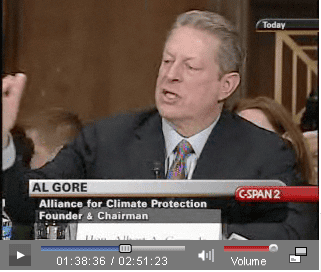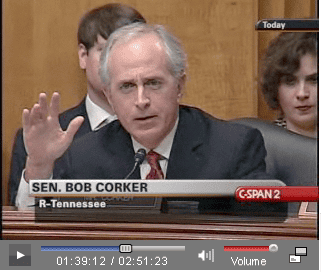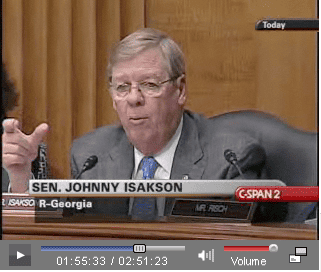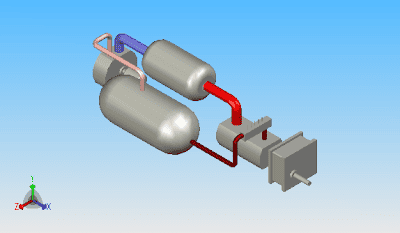If the Planet is in Peril – Why Are the Biggest Doomsayers So Focused on the "Cost" of Nuclear Power?

On January 28, 2009, the Senate Foreign Relations committee invited former Vice President Al Gore in to testify about global climate change at its first major policy related hearing of the current Congress. Through the amazing tool of C-span video, I watched and listened carefully to the entire hearing yesterday morning before going to my day job in Washington. (Yes, I am a wonk, a geek and an insomniac.)
I heard some very sobering testimony and watched some fascinating new additions to the ever expanding slide show including one animation that made the arctic sea ice look like a beating heart. (You can find the explanation and the new animation starting at about minute 35:45 in the C-span recording linked above.) Since this testimony took place in front of the Senate Foreign Relations committee, both the former VP and the members of the committee rightly expressed their concerns about the impact on international relations of a continued dependence on fossil fuels from some rather unsavory and unstable regimes around the world.
As many of you know, I am concerned about the continued use of the thin layer of atmosphere that surrounds the earth as a free dumping ground and I am also concerned about the effects of continued fossil fuel addiction on the chances for peaceful and prosperous development for the earth’s human population. I have been studying this aspect of energy for quite some time; some members of the seminar course I took in Strategy and Policy nicknamed me “Fuels” for the way that I frequently introduced resource competition into discussions of the background for many important historical events.
For the first hour and thirty-nine minutes, however, the elephant in the room sat silently as the assembled gathering talked about genetically modified biofuels (Senator Lugar wants those to be on the Copenhagen agenda), residential solar panels, revived solar thermal projects that have been in place for a couple of decades, wind mills, and California’s “successful” implementation of energy conservation.
(Aside: I heard yesterday that California, a state that used to lead the nation in “Space Age” manufacturing and education, is tied with Louisiana for the state with the lowest credit ranting and is in serious danger of breaking the tie to claim the cellar for itself. Since energy policy plays a huge role in economic policy, I have no interest in following California off of the cliff. End Aside)
The atomic elephant in the room spoke up – softly, respectfully and with a southern drawl – when Senator Corker, from Mr. Gore’s home state of Tennessee, ended his line of questioning about carbon taxes with the following:

“I agree with you that carbon capture and sequestration is a long ways off. My mind has a hard time understanding how, on a commercial scale, we are going to be doing it. One CEO that is highly involved in coal has said that “when donkeys fly”, okay, we will be dealing with that. I just have to ask, so, as we look at that and we look at energy production in this country, nuclear. One would have to believe that as we deal with the issue of carbon, that nuclear would have to play a huge role in that. I just wonder what comments you might have in that regard?”
I have mentioned Senator Corker before, he is one of the few Senators who is not a lawyer, but is instead a guy who majored in Industrial Engineering and built a multi-state construction company from the ground up. He knows a bit about the stuff that many people take for granted; the wiring, the pipes, the ducts, and the machinery that make our modern world function. I would bet he has crawled around a few machinery spaces in his career. Here is the response from the self-admitted “recovering politician” who builds slide shows and is a partner in an alternative energy venture capital fund.
“First of all just a brief comment on your statement about carbon capture. One of the places that actually has sequestered carbon is in Norway and it refers back to your earlier comment, because, if you ask them the secret to it they say, “Well we imposed a CO2 tax and we told the gas producers out in the North Sea where it has particularly high CO2 content that if they could capture and sequester it safely they wouldn’t have to pay the tax so they said okay”.
They went and they’ve done it fairly successfully. Now, it is a unique set of conditions.
(Aside: You bet it is. Separating CO2 from natural gas is a completely different chemical problem from separating CO2 from a hot combustion waste stream. Besides, the gas companies HAVE to separate CO2 from methane anyway in order to make a salable product. They just normally vent it to the atmosphere. End Aside)
There is a demonstration project in Algeria. It is not impossible, just implausible that it can be done on widespread scale.
Now on nuclear, I used to represent Oak Ridge, as you do now, where my constituents were in those years immune to the impacts of radiation, so I was very enthusiastic about nuclear power. And I came to the Congress in 1976 as a very strong supporter of nuclear power. I have grown skeptical about the degree to which it will expand. I’m not opposed to it, but there is now in the industry absolutely zero ability to predict with any confidence what the cost of construction is. The nuclear waste storage problem will undoubtedly be solved, but there are other problems. They only come in one size, extra-large.
Let me stop for a moment and ask all of you to help me remind the politicians that they need to have good researchers on their staffs that can help them avoid silly statements. Gore has made this “extra-large” comment many times in the past, even though nuclear plants have always come in a variety of sizes, even commercially.
When utilities want smaller plants, all they have to do is keep telling the suppliers that they are interested and will buy them. Even without the major electric power utilities along for the ride, a number of companies have recognized that a one size fits all model is stupid in today’s economy, so Hyperion, NuScale, Toshiba, PBMR, and a number of other companies are developing products designed to fill a variety of energy needs with fission based power plants.
Here is the rest of Mr. Gore’s response to Senator Corker:
…And when utilities have a limited construction budget and an uncertain demand projection because with the price of oil going up and down and new conservation measures coming in, they fear we might face the kind of situation we faced in the Tennessee Valley area in the 70’s and 80’s where TVA started all th
ese new nuclear plants on an assumption that there was going to be a 7 percent annual increase in electricity usage and then the energy crisis dropped it down to 1 percent.
So they cancelled all those plants and the ratepayers are still paying for the unbuilt plants. The utility executives became allergic to placing large bets on large increments with uncertain construction costs over a long period of time into the future. And that’s why you had in the last year, by far the largest new construction of electricity generation was with renewables. Coal has actually gone down, renewables have gone up, and nuclear has been at kind of a standstill.
Now I think there will be some new nuclear plants, but the proliferation consequences will limit its spread as a worldwide option. If it did expand dramatically we would run out of fuel in relatively short order unless we went to reprocessing. Reprocessing makes it hugely more expensive and actually expands the quantity of high-level waste that has to be safely sequestered. That’s counter intuitive, I used to think that reprocessing would cut down of the waste; it actually increases the amount of waste and the costs. So, for all those reasons, I think that it will play a small extra role, I don’t think it is a silver bullet and I don’t think it will play a large role.
I have heard that “hugely more expensive” comment in previous commentary and testimony, but I was not sure where Mr. Gore was getting his information. Later on in the testimony, he mentioned that one of the sources for that comment was some work done by Dr. Allison MacFarlane, a professor at George Mason University. I found a December 2003 paper on which she is a coauthor titled The Economics of Reprocessing vs. Direct Disposal of Spent Nuclear Fuel. Here is a quote from that paper’s executive summary:
At a uranium price of $40/kgU (comparable to current prices), reprocessing and recycling at a reprocessing price of $1000/kgHM would increase the cost of nuclear electricity by 1.3 mills/kWh (Emphasis added). Since the total back-end cost for the direct disposal is in the range of 1.5 mills/kgWh, this represents more than an 80% increase in the costs attributable to spent fuel management (after taking account of appropriate credits or charges for recovered plutonium and uranium from reprocessing).
Now, an 80% increase in the cost of spent fuel management might sound like a huge cost increase, but a 1.3 mill (0.13 US dollar cents) per kilowatt-hour increase in the cost of electrical power generation sounds like decimal dust to me.
About ten minutes after Senator Corker’s question, I found a new – to me – hero in the Senate named Johnny Isakson. Here is the very deferential way that he challenged Mr. Gore’s “damning with faint praise” commentary about nuclear power.

I want to return to nuclear. Sen. Corker brought it up, you and I have engaged on this before. A couple of things, from 2000-2006, the leading country in the world in carbon reduction was France, 6 percent, the United States, 3 percent. The primary difference that I can see is that they generate almost all their electric energy from nuclear. A couple of things you said I want to just talk about for a second. One is, I had always understood and I stand to be corrected, I defer to your position, you’re probably right and I’m probably wrong, but I had always been led to believe that the reprocessing of nuclear spent fuels for a second use reduced by 90 percent the storage problem. You said it was a greater storage problem, so I am not questioning you, I am questioning myself, but that’s what I had been told.
Mr. Gore stated that he had shared that view until recently when he learned more and he also made a rather snide comment about the fact that the nuclear industry has recently begun – correctly – referring to fuel reprocessing as “recycling”. Wonder where they got that idea?
Senator Isakson then challenged Mr. Gore about his interpretation of the economic history of nuclear power and the reason that the plant construction ground to a halt.
Secondly, this I am right about. Cause, I went through this in the 1970’s, I was in state legislature. The WPPSS (Washington Public Power Supply System) bonds collapsed in Washington State, they stopped building the nuclear plants and TVA had their difficulties.
But I don’t think it’s a correct assumption that they made a misassumption on the growth of demand. What in fact happened, was that the formation of capital and the cost of service, they went so great; the cost of the plants went through the roof. Washington State Public Power was paying 15 3/4 percent tax free on those bonds, because that was what happened in that market place at that time.
Which brings me to a suggestion, I am advocate of nuclear, I do not think that if you accept every dire circumstance of climate change and I’m not saying I don’t, I’m just saying that if you accept every dire circumstance and you take a clean reliable source of energy that we know works off the table or you make it so difficult to do it that you can’t do it I don’t think you can ever get to the solution you are seeking.
I will tell you this, construction work while in progress is a mechanism of financing a power plant by putting it in the rate base and paying cash as you go for a significant part of it that removes the debt service interest component from the cost of the plant and gives you a reliable way to deal with the cost of building those plants.
…
Bob (Corker) is a much better businessman than I am, but there are a lot of ways to skin a cat. And if we have the dire circumstances we’re facing we need to find everyway to skin every cat. And I think creative mechanisms in financing and a more open mindset on our part to using safe, reliable, renewable nuclear energy, makes a lot of sense. I apologize for making a little speech there.
Senator Isakson has a pretty clear understanding of a major input to the decision process that led to the halt to new nuclear power plant construction. The data do not back up Mr. Gore’s analysis – yes, the rate of growth in demand slowed down a bit, but actual demand for electricity has only decreased once (from 1973-1974) in the period since 1949, when the Energy Information Agency electricity consumption data tables begin.
If electrical power demand had stopped growing so that we did not need any new plants, we would never have increased the rate at which we burn coal for electric power from about 400 million tons per year in the mid 1970s to about 1,024 million tons per year in 2007. In the period staring in 1974, when the nuclear plant order book slammed shut, electricity consumption in the United States increased from 1,700 Billion kilowatt-hours to 3,748 Billion kilowatt-hours in 2007.
Mr. Gore responded to Senator Isakson with a comment that sounds like it came directly from Amory Lovins:
I don’t take nuclear off the table. I’m not a reflexive opponent of nuclear; I just don’t see any at risk private dollars going into it. Because you know, France, Areva, their big company there, is 92 percent owned by the French government and
95 percent of its output goes to the French government. So again the private “at risk” dollars – that’s what is one indicator of whether the market is really betting on this or not. If it does, fine. We need to solve these problems. But I just don’t think it is going to play that much of a bigger role.
It is time for us to really challenge this kind of talk, especially given the demonstrated performance record of all of the stuff that “private risk capital” has been “betting on” for the past dozen or more years. Rather than putting real dollars into well designed capital projects that enable manufacturers to make useful products – like reliable, emission-free electricity – and useful employment opportunities for Americans – so they can continue to consume in a rational way, AFTER they have earned money by producing things of value – American financial wiz kids bet on all kinds of crazy schemes to put fast money into their own pocket. The rest of the world – especially the Chinese government – is coming to the conclusion that we have not been very good economic role model in recent years. Though I love being an American, I cannot fault the analysis.
Here is how the southern gentleman from Georgia responded to Mr. Gore’s remark about private investments in nuclear power.
Well, I appreciate the response. I know I don’t have any more time, just respond a little bit on that. What with the parameters that government allows vis-av-vis finance has a lot of difference in whether private capital will chase that type of investment or not. And the lack of belief right now of by most private investment that nuclear will be sanctioned by this country in any form or would not be subject to a reaction keeps those dollars from following it. So it is in our interest both from a financing mechanism as well as from the regulatory side to develop some level of confidence. The cost of that capital will go down and the formation will expand. But again thank you very much for your testimony today.

As a guy who has spoken to dozens of potential investors for a project to build small, safe, reliable, emission free atomic engines over the past 15 years, I can vouch for Senator Isakson’s analysis. The BIGGEST barrier to financial investment into nuclear power is the fear that any investment is at a constant risk of having its foundations removed by a stroke of a government pen. Just look what happened to the private risk capital that was building up a fuel recycling industry in the mid 1970s or what happened to Long Island Lighting Company when it finally completed and licensed the Shoreham nuclear power plant.
One of the reasons that there are so many companies interested in building nuclear plants in the UK, despite the fact that the government announced that it would not provide subsidies is that the government did announce – from both major parties – a policy that stated that the government would enable the projects to be completed and operated if they met the existing safety standards.
If the leaders in the battle against climate change, the Senate, the House and the Executive Branch really want to address the enormous challenges of climate change and energy security they MUST put nuclear fission into their list of approved tools. Mr. Gore, who quoted both James Hansen and James Lovelock about their diagnosis of the dangers of climate change, needs to listen more carefully to their prescriptions for the cure.
Update posted February 7, 2009: William Tucker, author of Terrestrial Energy, published a related article on The Energy Collective titled Al Gore Captivates Congress
